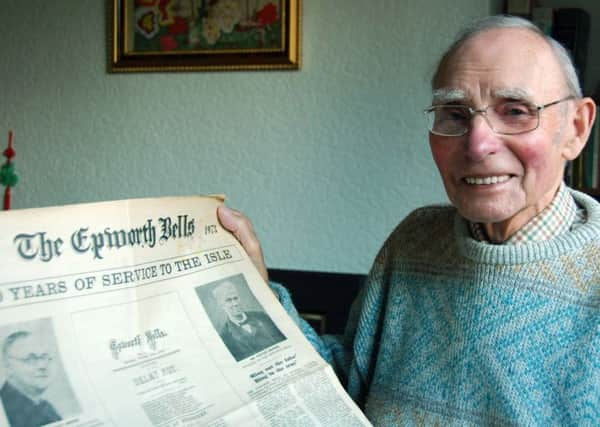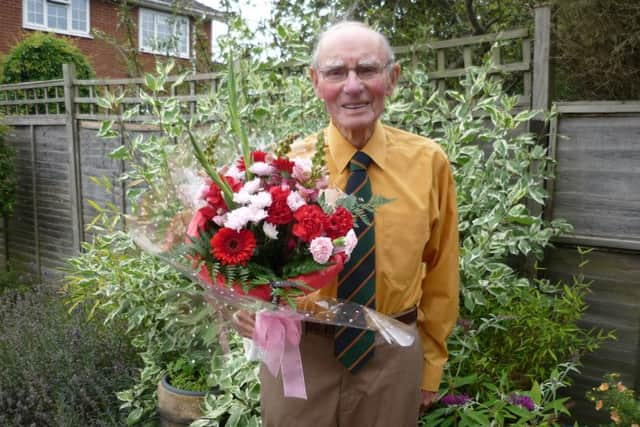Tributes paid to “true gentleman” Derrick French


In his eulogy, Derrick, who lived in Misterton with his soul mate and wife Bett, was described as: “A true, quietly spoken gentleman in every sense of the word. A man of the north. Quick witted and humorous with great integrity. He was patriotic, modest and humble but above all a loving and greatly loved husband, father, granddad and great granddad and friend to many.”
Derrick was born on May 30 1921 in Sheffield. Son to John and Clara French and brother to Joan, his father was a blacksmith, something that Derrick was particularly proud of.
Advertisement
Hide AdAdvertisement
Hide AdHe was a sickly child up to the age of ten but resolved to get himself fit by running the hills in his beloved countryside with his dog Rex.


During his school days he wrote and produced a magazine for the school called ‘Model Aero News’, all about model aeroplanes, which he sold for three old pence.
He completed his education at the Sheffield Technical School of Art and initially began training as an architect but his love of the English language and his ability to write it secured him work as a junior reporter finding stories for the Sheffield Telegraph.
At 20 years old, he was called up to serve in the 2nd Derbyshire Yeomanry Reconnaissance Unit becoming a scout for the 7th Armoured Division and other formations for the duration of World War Two. He saw service in the Western Desert and the Battle of El Alamein and played an integral part in the liberation of France and Holland.
Advertisement
Hide AdAdvertisement
Hide AdDuring his service overseas he continued to write articles that he sent home to the Sheffield Telegraph, stories about local Sheffield men whom he met serving on the front line.
After the war, Derrick resumed his journalistic career on the paper, eventually being appointed deputy editor before moving on to freelance work and relocating to Lincolnshire in 1955.
He was now married to Sylvia and became a loving father to three children.
Some years later, following separation from Sylvia he moved to Epworth in the Isle of Axholme, a place he had admired for many years, to become editor and photographer of the Epworth Bells. Here he became a well known and respected member of the community using the pages of the newspaper to champion Isle life and its people.
Advertisement
Hide AdAdvertisement
Hide AdHe was involved in Radio Humberside from its inception and did many BBC local and national broadcasts. He also worked for nine years for the government’s Central Office of Information, mainly writing features promoting British products abroad.
He also received commissions to write about technical subjects such as British scientific innovations and medical advances.
However, his passion was for writing about farming and the rural way of life.
While in Epworth, he met Bett. Their friendship developed into companionship and love and they were married in September 22 1983 at Scunthorpe Registry Office.
Advertisement
Hide AdAdvertisement
Hide AdBett took great interest and pleasure in Derrick’s passion for journalism, helping him in many ways.
Together they enjoyed holidays in Europe and Russia, exploring beyond usual tourist routes to experience real life as lived by the local people.
During a holiday to Paris in 1984 they met a French magazine editor who knew the village of Rolleville in Normandy. Derrick, as part of the ‘liberation exercise’, had been the first British soldier, along with his driver to enter the village in 1944 and he still held happy memories of the welcome he had received on that occasion. A phone call by the editor to the Mayor of Rolleville resulted in Derrick and Bett being invited as guests to take part in their 40th Anniversary of Liberation celebration and commemoration in September that year.
This was the beginning of many wonderfully hospitable and happy, return visits, both as honoured guests to subsequent anniversaries and in a private capacity to individuals with whom Derrick and Bett had formed deep friendships. These treasured friends have also visited them in Misterton.
Advertisement
Hide AdAdvertisement
Hide AdDerrick never officially retired. He and Bett attended many varied events and he was often called upon for his experience by different people in the media industry.
His enquiring mind and thirst for knowledge never faltered in old age and although his failing eyesight restricted his ability to record his thoughts, he continued to construct poetry and recall memories from the distant past to keep his mind active.
Derrick was positive throughout his stay in hospital, joking and talking to porters and staff as they tended him and when he knew the final outcome of his condition he accepted it with bravery and dignity in much the same way as he had lived his life.
He was supported and cared for by his devoted wife, Bett to the end.
Advertisement
Hide AdAdvertisement
Hide AdA true, quietly spoken gentleman in every sense of the word. A man of the earth. Quick witted and humorous with great integrity. He was patriotic, modest and humble but above all a loving and greatly loved husband, father, granddad and great granddad and friend to many. He will be greatly missed by all.
Bett said: “He was so modest. The Bells was his baby. I’m going to miss him so much.”
Former colleague Stuart Pearcey said: “Derrick first discovered Lincolnshire in the days when so many families from South Yorkshire took holidays on the Lincolnshire coast that newspaper companies flew papers in, landing aircraft on cleethorpes beach. He hitched a lift on one flight, and spent several weeks walking around the county, sleeping in barns and haystacks.
“He always said he enjoyed that summer, which was when he fell in love with the county, and emotionally never left it.
Advertisement
Hide AdAdvertisement
Hide Ad“The way Derrick worked in his respectful and gentle way hid an interesting wartime career, including organising the surrender of a significant number of German troops when he was at the head of a British advance in his scout car.
“It was a pleasure, in later years, to be able to re-visit some of Derrick’s pictures in The Bells under the series title ‘The French Collection’. I know that made him smile.”
Friend and former work colleague Ron Shipley said: “He was a true gentleman and a good colleague. I admired him for all the work he did for the Bells, remembering that not only did he provide the editorial but he also took the photographs.
“He was one of the best, both as a man and in the world of editorial.”